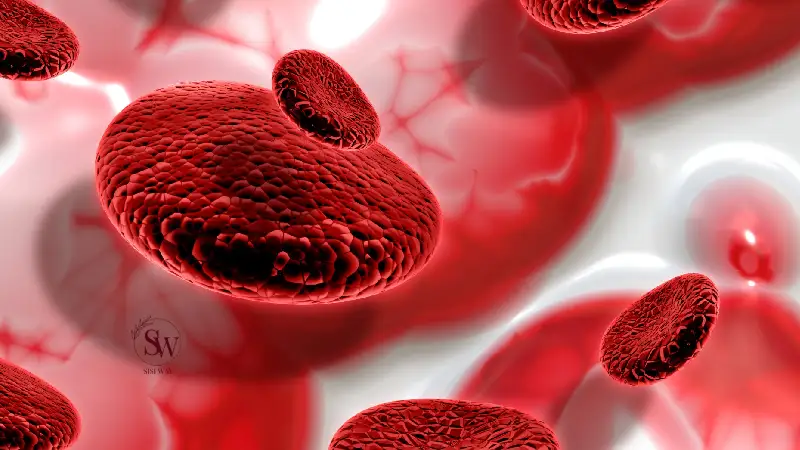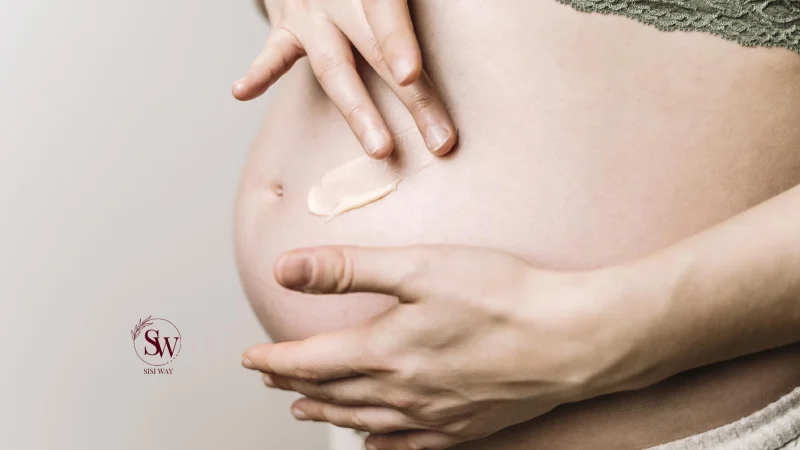
Is Really Dry Skin a Sign of Pregnancy?
Pregnancy is a transformative journey that brings about numerous changes in a woman’s body. Alongside the more well-known physical and hormonal shifts, some women may experience changes in their skin, including dryness. Dry skin during pregnancy can be attributed to hormonal fluctuations, increased blood volume, and changes in the body’s hydration levels. In this article of sisiway, we will explore the relationship between dry skin and pregnancy, address common concerns, and provide tips for managing dryness effectively.

Hormonal Factors:
During pregnancy, hormonal factors play a significant role in the development of dry skin. The surge in hormones, such as estrogen and progesterone, can disrupt the skin’s natural moisture balance. These hormonal changes can lead to increased water loss through the skin, resulting in dryness, itchiness, and a feeling of tightness. Additionally, hormonal fluctuations can affect the production of sebum, the skin’s natural oil, further contributing to dryness. Understanding the influence of hormonal factors on dry skin during pregnancy helps expectant mothers take proactive steps in managing and alleviating these symptoms, such as maintaining proper hydration, using gentle moisturizers, and avoiding harsh skincare products.
Increased Blood Volume:
The increased blood volume experienced during pregnancy can have implications for the skin, including dryness. As the body works to support the growing fetus, there is a redistribution of blood flow, with a greater supply directed towards vital organs. This can result in reduced blood circulation to the skin, leading to a decrease in moisture and potential dryness. The decreased blood supply to the skin can impair its ability to retain water and essential nutrients, contributing to dry and dehydrated skin. It is important for pregnant women to be mindful of this effect and take steps to mitigate dryness, such as staying adequately hydrated, using moisturizers, and avoiding excessive exposure to dry environments.

Changes in Hydration Levels:
Changes in hydration levels can have a significant impact on the occurrence of dry skin during pregnancy. As the body undergoes various physiological changes to support the growing baby, there is an increased demand for fluids. If a pregnant woman does not consume enough water or fluids, it can lead to dehydration, which in turn affects the skin’s moisture content. Dehydration can exacerbate dryness, making the skin feel tight, itchy, and uncomfortable. It is crucial for expectant mothers to prioritize adequate hydration by drinking plenty of water throughout the day and consuming hydrating foods to help maintain optimal skin hydration and minimize the risk of dry skin during pregnancy.
Increased Sensitivity:
During pregnancy, some women may experience heightened skin sensitivity, which can contribute to dryness. The skin may react more strongly to environmental factors, such as harsh weather conditions, irritants, or allergens, leading to dry and irritated skin. This increased sensitivity can also be attributed to hormonal changes that affect the skin’s barrier function, making it more susceptible to moisture loss and dryness.
Read more: When is a Woman Most Fertile?
Stretching of the Skin:
As the pregnancy progresses, the skin stretches to accommodate the growing baby bump. This stretching can cause the skin to become tight and prone to dryness. The stretching can disrupt the normal functioning of the skin’s moisture barrier, leading to increased water loss and dryness. Additionally, the stretching of the skin can also cause itching and discomfort, further contributing to dry skin symptoms. It is important for pregnant women to moisturize regularly and use products specifically formulated to support the skin’s elasticity during this period.

Managing Dryness During Pregnancy:
Managing dryness during pregnancy is a common concern for many expectant mothers. Hormonal changes, increased water demands, and environmental factors can contribute to dry skin and discomfort. However, there are several effective strategies for maintaining optimal skin hydration and alleviating dryness.
Hydration:
Maintaining optimal hydration is a key remedy for combating skin dryness during pregnancy. Drinking an adequate amount of water throughout the day helps replenish the body’s water stores and supports healthy skin hydration. Proper hydration helps to improve skin elasticity, promote a healthy moisture balance, and reduce the likelihood of dryness. Additionally, incorporating hydrating foods into the diet, such as fruits and vegetables with high water content, can contribute to overall hydration levels. By prioritizing hydration, expectant mothers can support their skin’s natural moisture barrier, alleviate dryness, and promote a healthy and comfortable pregnancy experience.

Moisturize:
Moisturizing regularly is an effective remedy for combating skin dryness during pregnancy. Applying a nourishing and hydrating moisturizer helps to replenish the skin’s moisture barrier and lock in essential hydration. Opting for gentle, fragrance-free moisturizers that are specifically formulated for sensitive skin can provide relief from dryness and alleviate discomfort. It is recommended to moisturize the skin immediately after showering or bathing when the skin is still damp, as this helps to seal in moisture. By incorporating a consistent moisturizing routine into their daily skincare regimen, pregnant women can help restore and maintain the skin’s natural moisture balance, promoting soft, supple, and hydrated skin throughout their pregnancy journey.

Mild Cleansers:
Using mild cleansers is a beneficial remedy for managing skin dryness during pregnancy. Harsh soaps and cleansers can strip the skin of its natural oils, exacerbating dryness and causing further irritation. Opting for gentle, soap-free cleansers that are specifically formulated for sensitive skin can help maintain the skin’s moisture balance while effectively cleansing. These mild cleansers are less likely to strip away the skin’s natural oils and disrupt its protective barrier. It is advisable to avoid hot showers or baths, as hot water can further dry out the skin. By incorporating mild cleansers into their skincare routine, pregnant women can gently cleanse their skin without compromising its hydration, helping to prevent and alleviate dryness.

Humidifier:
Using a humidifier is an effective remedy for combating skin dryness during pregnancy. Pregnancy hormones and environmental factors can contribute to decreased humidity levels, leading to dry air that can further dehydrate the skin. By using a humidifier in the living space, moisture is added to the air, creating a more humid environment. This helps to counteract the drying effects of indoor heating or dry weather conditions, providing relief for dry skin. The increased humidity helps to replenish the skin’s moisture levels and prevent excessive water loss, promoting a healthier and more hydrated complexion. Incorporating a humidifier into the home can be particularly beneficial during the winter months or in dry climates, ensuring the skin remains adequately moisturized and minimizing the discomfort associated with dry skin during pregnancy.
Avoid Irritants:
Avoiding irritants is a crucial remedy for managing skin dryness during pregnancy. Certain skincare products, soaps, detergents, and fragrances can contain harsh ingredients that can further strip the skin of its natural oils and exacerbate dryness. It is advisable for pregnant women to opt for gentle, hypoallergenic products that are free from irritants and fragrances. Reading labels and choosing products specifically formulated for sensitive skin can help minimize the risk of irritation and dryness. Additionally, it is important to avoid exposure to other potential irritants, such as excessive sun exposure, hot water, and harsh weather conditions. By being mindful of potential irritants and making conscious choices to avoid them, pregnant women can protect their skin’s moisture barrier and maintain optimal hydration levels, thus reducing skin dryness.
Clothing Choices:
Choosing the right clothing can serve as a helpful remedy for managing skin dryness during pregnancy. Opting for loose-fitting, breathable clothing made from natural fibers, such as cotton or bamboo, allows air to circulate around the skin, reducing moisture loss and preventing excessive dryness. These fabrics are gentle on the skin and less likely to cause irritation or friction. Avoiding tight or synthetic clothing that can trap moisture and heat against the skin is also advisable. By selecting clothing that promotes proper airflow and minimizes irritation, pregnant women can help maintain the skin’s natural moisture balance and alleviate dryness, contributing to overall skin comfort during pregnancy.
How to Treat Dry Skin on Face During Pregnancy?
Treating dry skin on the face during pregnancy requires a gentle and hydrating approach. Here are some steps to effectively address dryness:

-
Cleanse with a gentle face wash:
Use a mild, fragrance-free cleanser specifically formulated for sensitive skin. Avoid harsh soaps or cleansers that can strip away natural oils. Wash your face twice a day with lukewarm water to remove impurities without drying out the skin.
-
Moisturize regularly:
Apply a rich, hypoallergenic moisturizer after cleansing to lock in moisture and restore hydration. Look for products that contain ingredients like hyaluronic acid, glycerin, or ceramides, which help attract and retain moisture in the skin. Apply the moisturizer to slightly damp skin to seal in moisture effectively.

-
Use a gentle exfoliator:
Exfoliation can help remove dead skin cells and improve the absorption of moisturizers. However, during pregnancy, it’s important to opt for a gentle exfoliator without harsh chemicals or abrasive particles. Consider using a mild chemical exfoliant with ingredients like lactic acid or fruit enzymes, which provide gentle exfoliation without causing irritation.

-
Protect from the sun:
Apply a broad-spectrum sunscreen with SPF 30 or higher daily to shield your skin from harmful UV rays. Pregnancy hormones can make the skin more susceptible to sun damage, so sun protection is crucial. Choose a pregnancy-safe sunscreen that is free from chemical sunscreens like oxybenzone or avobenzone. Try to use the best sunscreen for dry skin to prevent dryness and damage to the skin’s layers from harmful sun rays.

-
Hydrate from within:
Drink plenty of water throughout the day to keep your body hydrated, which will also benefit your skin. Aim for at least eight glasses of water daily to maintain optimal hydration levels.
-
Avoid irritants:
Steer clear of skincare products or cosmetics that contain harsh chemicals, fragrances, or known irritants. These can further exacerbate dryness and irritation. Opt for gentle, hypoallergenic products suitable for sensitive skin.
If your dry skin persists or becomes severe, it’s best to consult with a dermatologist or healthcare provider for personalized advice and treatment options.
When to Consult a Healthcare Provider:
While dry skin is a common occurrence during pregnancy, it is important to seek medical advice if the dryness becomes severe, is accompanied by intense itching, or if there are other concerning symptoms. Your healthcare provider can evaluate your condition and provide appropriate guidance or recommend further treatment if necessary.
FAQ
- Is dry skin a symptom of pregnancy?
Yes, dry skin can be a symptom of pregnancy due to hormonal changes and increased water demands.
- When does dry skin usually occur during pregnancy?
Dry skin can occur at any stage of pregnancy, but it is more commonly experienced during the second and third trimesters.
- How can I alleviate dry skin during pregnancy?
To alleviate dry skin during pregnancy, it is important to maintain proper hydration by drinking plenty of water, using gentle and hydrating skincare products, avoiding harsh chemicals and irritants, and using a humidifier to add moisture to the air.
Conclusion:
Dry skin during pregnancy is a common occurrence due to hormonal changes and shifts in hydration levels. While it may be bothersome, there are various measures you can take to manage and alleviate dryness. By staying hydrated, moisturizing regularly, using mild cleansers, and taking other preventive measures, you can promote healthy, hydrated skin throughout your pregnancy journey. Remember to consult your healthcare provider if you have any concerns or if your symptoms worsen.
Also read: How to Boost Fertility in Your 30s?



